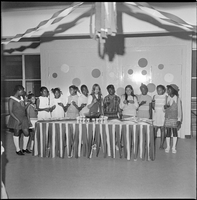Search the Special Collections and Archives Portal
Search Results
University of Nevada, Las Vegas Poster Collection
Identifier
Abstract
Collection is comprised of posters collected by the University of Nevada, Las Vegas (UNLV) Special Collections and Archives from 1974 to 2010. The collection primarily includes posters about events and exhibits hosted by UNLV Special Collections and Archives. Also included are posters for other UNLV events including: theatrical events, sporting events, colloquiums, choral productions, and events where UNLV was a partner.
Archival Collection
Gladys Boggs Marshall Photographs
Identifier
Abstract
The Gladys Boggs Marshall Photographs contain nine black-and-white photographs of Gladys Boggs Marshall from approximately 1912 to 1975. The photographs include three team photographs of the Clark County High School girls' basketball team, of which Gladys Boggs was a member, and four photographs of Gladys Boggs Marshall and her husband Edward B. Marshall spending time with the Ullom Family.
Archival Collection
Fred Holland Jr. oral history interview
Identifier
Abstract
Oral history interview with Fred Holland Jr. conducted by Claytee D. White on April 03, 2019 for the Boyer Early Las Vegas Oral History Project. In this interview, Holland discusses why his family moved to Boulder City, Nevada in 1931 where his father began working on the construction of the Hoover Dam. He talks about the types of work his father did, the means in which his family survived harsh conditions, what it was like going to school in Boulder City, his enlistment in the United States Air Force during World War II, and his experiences with the Boulder City Gun Club.
Archival Collection
Jean Olen Papers
Identifier
Abstract
The Jean Olen Papers (1994-2008) document Olen's career as a taxicab driver in Las Vegas, Nevada. Materials include Olen's personal taxicab driver's permit, medical examiner certificate, and other placards found in taxicabs regarding common questions, such as tipping, no smoking, and airport fees. Also included are newspaper clippings about taxicab drivers in Las Vegas, Nevada and four issues of
Archival Collection
Ken Stichter oral history interview
Identifier
Abstract
Oral history interview with Dr. Ken Stichter conducted by Kate Ward on March 08, 2003 for the Public School Principalship Oral History Project. In this interview, Dr. Stichter reflects upon his career as a teacher and administrator in Southern California. He describes his motivations for becoming a principal, his regular responsibilities and challenges, and his working relationships with teachers, students, and other administrators. He also discusses his experience as an assistant superintendent, and compares it with his experience as a principal.
Archival Collection
Brenda Arnold oral history interview
Identifier
Abstract
Oral history interview with Brenda Arnold conducted by Janet E. Prince on February 28, 1977 for the Ralph Roske Oral History Project on Early Las Vegas. Arnold discusses her career as a librarian, her religious activities in Las Vegas, Nevada, and viewing the above-ground atomic testing. She also recounts activities she did while visiting Lake Mead and Harris Springs at Mount Charleston.
Archival Collection
Andre King oral history interview
Identifier
Abstract
Oral history interview with Andre "Brother Dre" King conducted by Claytee D. White on July 20, 2018 for the Remembering 1 October Oral History Project. In this interview, King recalls learning judo and wrestling at an early age. After spending ten years in prison for a burglary offense, he served an additional eleven years in facilities across the state. After twenty-one years in the system, King is now a nondenominational spiritual being and once he learned about the Healing Garden for 1 October victims, he went there daily, during and immediately after the construction. King has helped many survivors and has healed himself as well, through giving love, hugs, and spiritual inspiration.
Archival Collection
Marie Wakefield oral history interview
Identifier
Abstract
Oral history interview with Marie Wakefield conducted by Ashley Hardison on November 30, 2008 for the Public School Principalship Oral History Project. In this interview, Wakefield reflects upon her career as an administrator with Nevada’s Clark County School District. She describes her experience as principal of Myrtle Tate Elementary School, her regular job responsibilities, and challenges that she faced. She also describes her experience as an African American woman, and the importance of student and faculty diversity within schools.
Archival Collection


